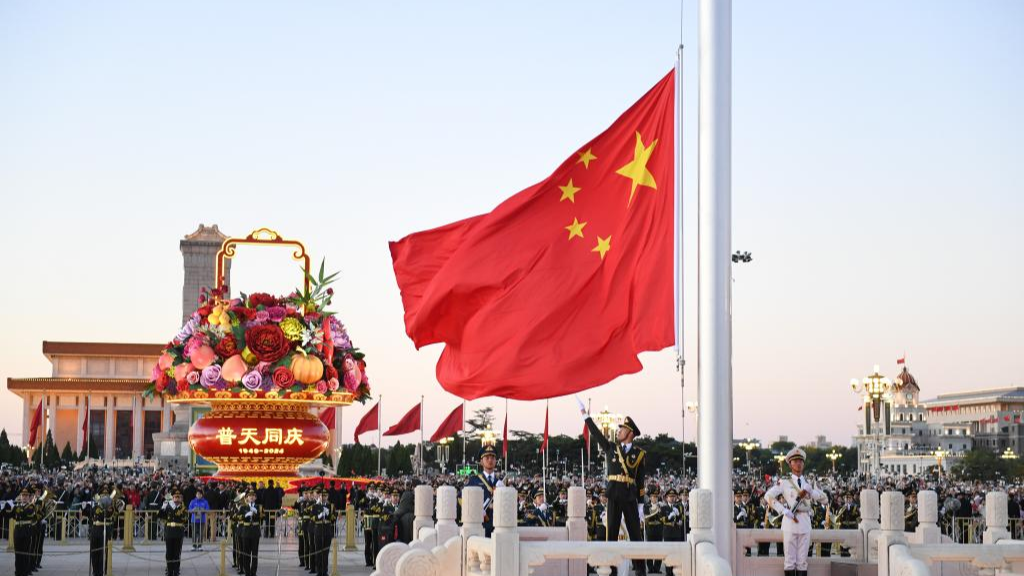By Wolfram Adolphi

A flag-raising ceremony marking the 75th anniversary of the founding of the People's Republic of China is held at Tian'anmen Square in Beijing, capital of China, October 1, 2024. [Photo/Xinhua]
There can't be any doubt about the tremendous success of China's poverty-alleviation efforts. The statistics speak a very clear language. Allow me to complement it from personal experience. I remember very well my first stay in China as a student in the spring of 1978. I lived on the campus of Beijing Language and Culture University, one bicycle-hour away from Tian'anmen Square, and saw a fundamentally different life compared with today's.
The campus was surrounded by old-style hutongs and small unpaved lanes, creating an atmosphere of rural backwardness and shortcomings. There were no modern buildings, no modern sanitation, no cars – only a few buses and numerous two-wheeled donkey- and horse-drawn carts. The shops offered only a few products and simple restaurants presented their meals in a very basic manner.
To avoid any misunderstanding: I like to look back on those days. I came to China from the German Democratic Republic (East Germany) to learn the Chinese language and to become more familiar with Chinese life, and I was full of optimism.
Being well-informed about the time before the founding of the People's Republic of China (PRC) in 1949 and aware of the ups and downs in the following decades, I was not surprised by what I saw.
Simultaneously, I was full of hope, as there were clear signs of change. After the reform and opening-up in 1978, along with the evolving domestic and international situation, the Communist Party of China continued to expand and deepen its focus on the "four modernizations." Brought in personal touch with this atmosphere, I felt that my sympathy for the Chinese people helped me understand the situation better and I became convinced that a path toward a better life would be found.
In 1987, I returned to China for a second time – as a scientist working with Peking University and the Second Historical Archives of China in Nanjing, Jiangsu Province – and saw an improvement in the situation. But it was only a slow amelioration compared with the almost indescribable change I witnessed in 2008 and 2011.
By then, Beijing had developed into a modern city with a remarkably high living standard which could compete with any capital around the world. The airports and flight traffic, high-speed trains, electric buses, supermarkets, schools and universities, cultural life, lifestyle, the digitalization of daily life, modern streets, subways, cars, and the high level of hospitality all left a deep impression on me when I returned home. I also visited other major cities and rural areas, and these experiences confirmed the tremendous, astonishing changes that had taken place.
The fact that a country could overcome poverty and backwardness in just a few decades is historically unprecedented. And the development doesn't stop. Friends who visit China more often than I do tell me that the modernization has even accelerated in recent years.

A view of downtown Changsha, central China's Hunan Province, June 7, 2023. [Photo/Xinhua]
When looking to the West, we are confronted with the strange situation that China's poverty-alleviation efforts are often met with mistrust and hostility. This is hard to understand. Isn't it clear that the success of Chinese poverty alleviation represents a success for mankind as a whole? China accounts for one fifth of the world's population – its living standard plays a decisive role in the overall development of global welfare.
Overcoming poverty in the Global South is a prerequisite for sustainable development worldwide. Poverty and deeply rooted inequality often resulting from colonialism create fertile ground for new wars, conflicts and enduring hostilities.
It is a tragedy that the leading groups of the Western countries have decided to classify China as a "systemic rival," to be antagonized and threatened with economic sanctions, military pressure and political isolation.
Instead of carefully examining the proposals the PRC has presented for peaceful coexistence, international understanding and a global governance framework which could foster collective efforts to solve the global challenges like climate change, shortage of resources and the advancement of artificial intelligence, the West strives for conflict and this path carries the risk of a new world war.
The success of China's poverty alleviation is based on a development concept known as socialism with Chinese characteristics. I observe it with curiosity, interest and sympathy. All countries are seeking ways to address the challenges of the modern world, and we should all be curious to learn from one another's approaches.
Humanity needs hope and public spirit, not partition, hostility, conflict or war. China's poverty alleviation efforts are combined with its international commitment to peaceful coexistence and common economic progress. Hopefully, the 75th anniversary of the founding of the PRC will serve as an occasion for the world to pay greater attention to the remarkable achievements China has made over the past few decades.
The author is a special commentator on current affairs for CGTN.

 中文
中文



